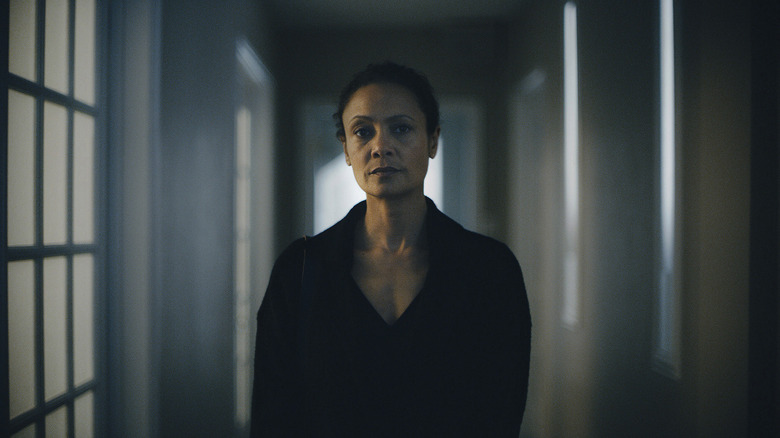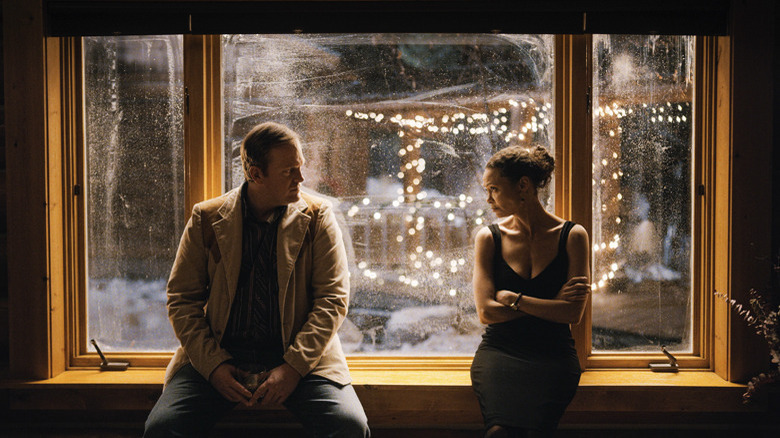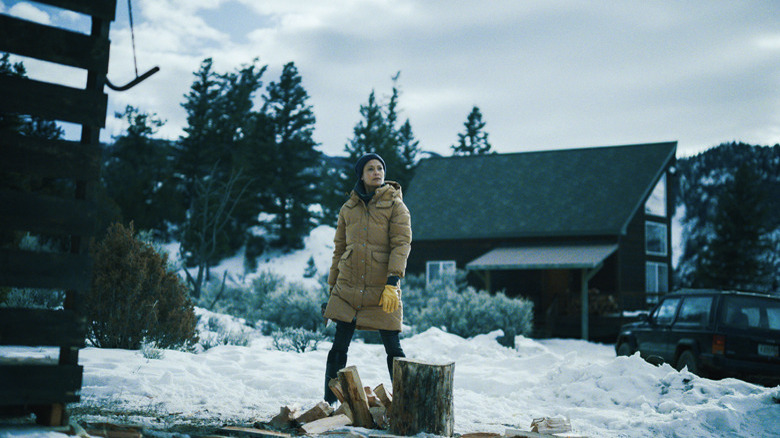God's Country Review: Thandiwe Newton Is Pushed To A Breaking Point [Sundance 2022]
Sandra (Thandiwe Newton), a university professor in Montana, has just lost her mother. Alone and stoically grieving in her mostly isolated A-frame cabin in the middle of the snowy countryside, Sandra notices a red pickup truck in her driveway belonging to a couple of local hunters. The thing is, that's her land, and she didn't give them permission to park there. She thinks about it for a second, then leaves a note on the windshield informing the hunters that this is private property and nicely asking them to park elsewhere next time.
You can probably guess what happens next. The good ol' boy hunters don't take kindly to being told what to do, so they keep coming back. Sandra tows their truck, and they retaliate by shooting an arrow into her front door at night. The escalation has begun, and in Julian Higgins' "God's Country," as in life, situations like this don't end well.
Society Has Failed Us
Sandra goes to the local acting sheriff (Jeremy Bobb, tapping into the same "love to hate him" energy he brought to his character on "The Knick"), who recommends that she forget about the whole thing and let bygones be bygones. But Sandra wants things to work the way they're supposed to — the cops should actually be able to help people in need, and the (white) dean of her department should seriously consider candidates of color for a vacant position instead of just paying lip service to the idea. Maybe it's the grief she's experiencing, or maybe because she's a Black woman who's dealt with micro-aggressions her entire life, but you get the sense that because there are so many things Sandra can't control, she at least wants – needs — to have control over a small thing like determining who can and cannot be on her property.
Sandra's extremely methodical about trying to resolve this problem, and when her mysterious backstory is eventually revealed, the script's aims begin to come into sharper relief: at its core, this is a movie about how the American experiment is failing, and how the societal systems we rely on are not equipped to adequately address problems that desperately need solving. That message is presaged in the film's opening scene, in which an unmanned slide projector cycles through images of westward expansion to an empty classroom. It's a silent scene, but we don't need words to tell us how that story goes: Americans used romanticized terms like "manifest destiny" to justify the oppression and slaughter of Indigenous populations, barging across this land and taking whatever we wanted. And as slight as Sandra's situation may seem to some, she knows that these guys ignoring, disrespecting, and threatening her is another point on that same continuum.
In Joel Schumacher's 1993 movie "Falling Down," Michael Douglas plays a middle-aged guy who snaps when his air conditioner goes out while stuck in traffic on the hottest day of the year. He's another character who wants society to live up to its end of the bargain — he's furious when he orders a fast food meal and it looks nothing like how it's advertised. But he becomes the embodiment of white privilege as he goes on a violent rampage across Los Angeles, often resulting in minorities getting caught in the crossfire. "God's Country" begins from a similar starting point, but the shift in perspective makes all the difference. "Falling Down" features a recently-fired guy yelling grievances about how the world has passed him by, and who almost immediately takes out his rage on individuals who are just trying to survive in a broken world. "God's Country" is a headier exploration of how impossible it can feel when trying to enact change in institutions, and how, when systems are rigged against the same people they're ostensibly set up to support, the empty hopelessness of that realization can lead to devastating outcomes.
Bleak, But Thought-Provoking
Thandiwe Newton is excellent in the lead role, and while I'm appreciative that her work in "Westworld" launched her into a different level of popularity as a performer, seeing how good she is here makes me wish she hadn't been stuck in that convoluted show for the past several years. Higgins, who co-wrote the script with Shaye Ogbonna, continually backs Sandra into a metaphorical corner, relentlessly pummeling her from all sides with grief, racism, and misogyny. She stands on the moral high ground for a majority of the movie, and we're right there with her as she goes through the proper channels to resolve her issue. But as Sandra slowly realizes that no meaningful help is coming, she begins to make decisions that make us raise an eyebrow, and the film starts presenting some fascinating questions. To what extent should you fight for a principle? Exactly how far is too far? And in a society in which marginalized people have been taken advantage of for hundreds of years, is there even such a thing as "too far"?
/Film Rating: 7 out of 10


